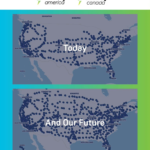Tesla Motors is the poster child for the whole project of electric car adoption. They make what may be the best car ever, the Tesla Model S, whose sales are growing to the point where it has a significant market share in luxury car sales. But if Tesla were to fail, then maybe it would set back the electric vehicle project. Therefore we always have in mind the question: Will Tesla succeed? Is Tesla’s business fundamentally sound, or will it always depend on the largesse of investors?
This year, 2013, is when Tesla shifted gears from losing gobs of money to earning gobs of revenue, enough to make the business almost profitable. Tesla is still in its ramp-up phase, with high costs on research, development, as well as capital costs building up manufacturing capacity. The company could easily be profitable at its current sales volume simply by cutting back on the expenses a bit, but they do have to rapidly grow to meet the opportunity in front of them. None of us want them to do so at this time, Tesla need to quickly grow into the company it needs to become.
Last week Solar City and Tesla announced a deal where Solar City would sell grid energy storage units using battery pack technology from Tesla![]() . That got me to thinking — how much does Tesla earn overall from its sales of components to 3rd party companies?
. That got me to thinking — how much does Tesla earn overall from its sales of components to 3rd party companies?
Tesla is selling drive train components to Toyota for the 2nd generation RAV4 EV, and is doing drive train development projects with Daimler for the Mercedes B-Class EV. The latter car is expected to go on sale in mid-2014 and will mean Tesla is selling components to two companies now. Add in Solar City as a third buyer of Tesla components, and you have a nice little growing line of business. But how much is it?
I wrote up the details over on PlugInCars![]() , but the bottom line is this:
, but the bottom line is this:
$1.398 billion revenue for the first 9 months of 2013
$1.386 billion for “automotive sales” and $11 million for “development services”
Of the automotive sales, $35 million came from component sales, and $130 million came from ZEV Credit sales; the remainder came from Model S sales
Or, about 12% of revenue coming from sources other than Tesla Model S sales
The ZEV credit sales really dried up over the year, as was predicted: $67.9 million in Q1; $51.5 million in Q2; and $10.4 million in Q3. Those numbers are according to 10Q’s released this year by Tesla.
Of the three areas of component sales, two will clearly grow, while one is likely to fade. That is, Toyota by all indications doesn’t care about EV’s at this juncture, they’re working on better battery technology and fuel cells while touting their hybrid cars. However, the relationships with Daimler and Solar City look strong. In Daimler’s case I found an article quoting one of their honcho’s saying Daimler wants to expand the relationship. In Solar City’s case – well – Elon Musk sits on their board, and their CEO is one of his relatives. It’s not surprising then that Tesla and Solar City have a long history of collaboration, and will continue doing so for a long time to come I expect.
All this means Tesla’s revenue is running at 90% or more in vehicle sales, and 10ish% in other income. The latter may never grow to be very much, but it does diversify their income stream a little. Enough that it makes some difference, and should help Tesla with its bottom line.
- Highway design could decrease death and injury risk, if “we” chose smarter designs - March 28, 2015
- GM really did trademark “range anxiety”, only later to abandon that mark - March 25, 2015
- US Government releases new regulations on hydraulic fracturing, that some call “toothless” - March 20, 2015
- Tesla Motors magic pill to solve range anxiety doesn’t quite instill range confidence - March 19, 2015
- Update on Galena IL oil train – 21 cars involved, which were the supposedly safer CP1232 design - March 7, 2015
- Another oil bomb train – why are they shipping crude oil by train? – Symptoms of fossil fuel addiction - March 6, 2015
- Chevron relinquishes fracking in Romania, as part of broader pull-out from Eastern European fracking operations - February 22, 2015
- Answer anti- electric car articles with truth and pride – truth outshines all distortions - February 19, 2015
- Apple taking big risk on developing a car? Please, Apple, don’t go there! - February 16, 2015
- Toyota, Nissan, Honda working on Japanese fuel cell infrastructure for Japanese government - February 12, 2015













